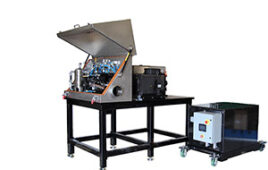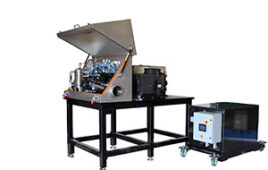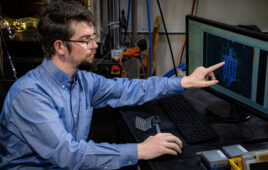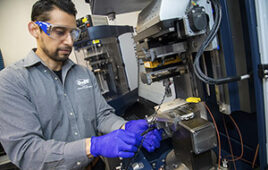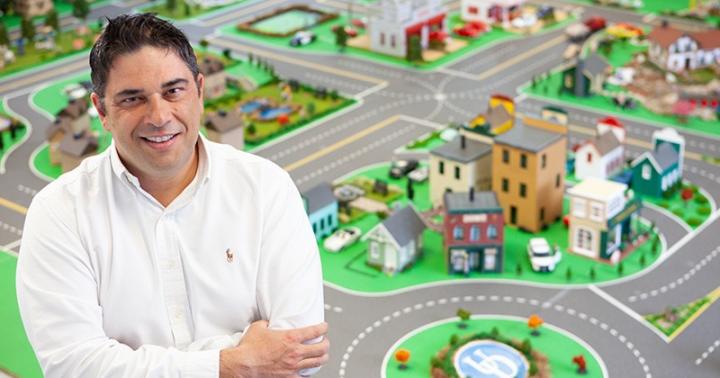
Andreas Malikopoulos tests technologies for connected and automated vehicles on a smaller scale at the University of Delaware’s Scaled Smart City (UDSSC) testbed. Credit: University of Delaware/ Owen Fitter
Imagine a daily commute that’s orderly instead of chaotic. Connected and automated vehicles could provide that relief by adjusting to driving conditions with little to no input from drivers. When the car in front of you speeds up, yours would accelerate, and when the car in front of you screeches to a halt, your car would stop, too.
At the University of Delaware, Andreas Malikopoulos uses control theory to develop algorithms that will enable this technology of the future. In two recently published papers, Malikopoulos, who was recently named the Terri Connor Kelly and John Kelly Career Development Professor of Mechanical Engineering, describes innovations in connected and automated vehicle technology pioneered in two laboratories at the University, the UD Scaled Smart City (UDSSC) testbed and a driving simulator facility.
“We are developing solutions that could enable the future of energy efficient mobility systems,” said Malikopoulos. “We hope that our technologies will help people reach their destinations more quickly and safely while conserving fuel at the same time.”
Making traffic lights obsolete
Someday cars might talk to each other to coordinate traffic patterns. Malikopoulos and collaborators from Boston University recently developed a solution to control and minimize energy consumption in connected and automated vehicles crossing an urban intersection that lacked traffic signals. Then they used software to simulate their results and found that their framework allowed connected and automated vehicles to conserve momentum and fuel while also improving travel time. The results were published in the journal Automatica.
Saving fuel and avoiding speeding tickets
Imagine that when the speed limit goes from 65 to 45 mph, your car automatically slows down. Malikopoulos and collaborators from the University of Virginia formulated a solution that yields the optimal acceleration and deceleration in a speed reduction zone, avoiding rear-end crashes. What’s more, simulations suggest that the connected vehicles use 19 to 22 percent less fuel and get to their destinations 26 to 30 percent faster than human-driven vehicles. The results of this research effort were published in IEEE Transactions on Intelligent Transportation Systems.
Malikopoulos has received funding for this work from two U.S. Department of Energy programs – the Smart Mobility Initiative and the Advanced Research Projects Agency – Energy’s NEXTCAR program.
Malikopoulos is the principal investigator of a three-year project funded by the Advanced Research Projects Agency for Energy (ARPA-E) through its NEXT-Generation Energy Technologies for Connected and Automated On-Road Vehicles (NEXTCAR) program to improve the efficiency of an Audi A3 e-tron by at least 20 percent. The partners of this project are the University of Michigan, Boston University, Bosch Corporation, and Oak Ridge National Laboratory.

